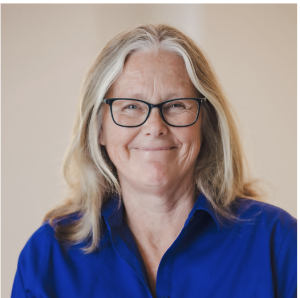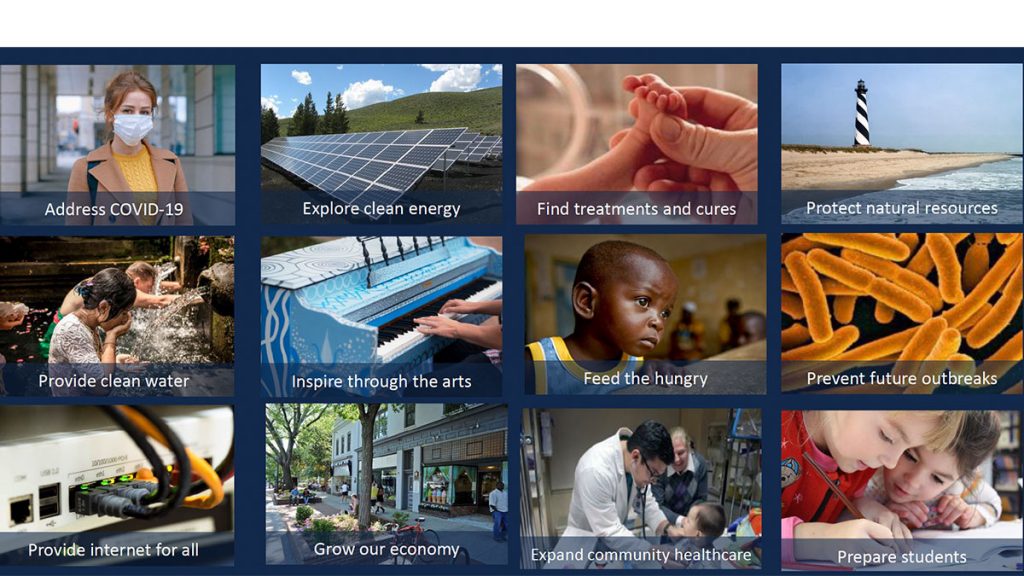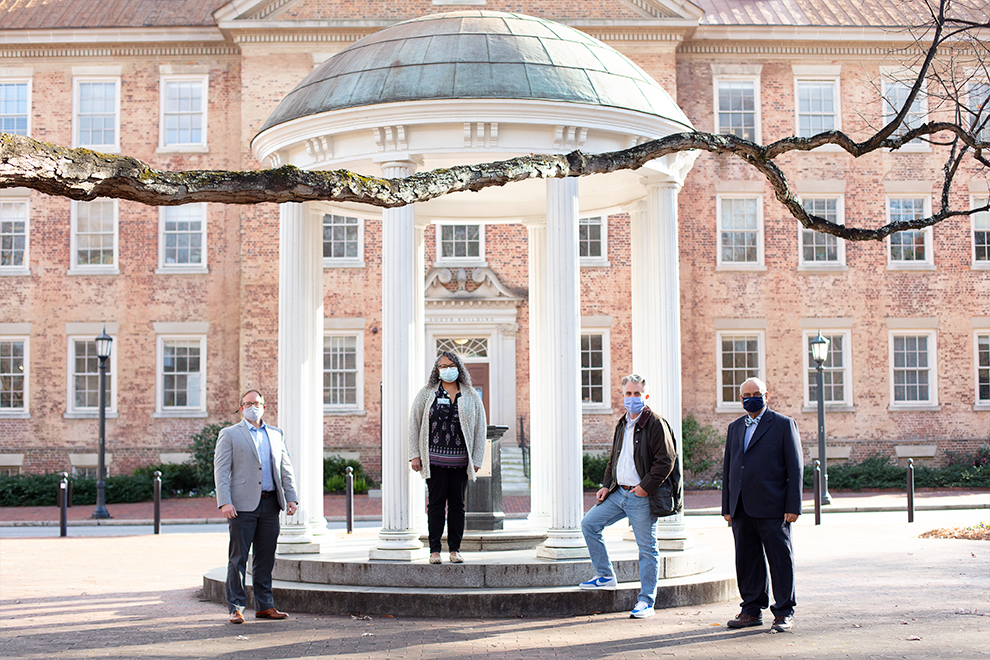Serve to Benefit Society
Serve to Benefit Society
Environmental Scan
UNC-Chapel Hill embraces with pride its status as the nation’s first public university and its call to public service – to the people of North Carolina and the region, nation and world. Our mission statement makes clear that we are a center for service and to extend our “knowledge-based services and other resources of the University to the citizens of North Carolina and their institutions to enhance the quality of life for all people in the state.”
The guiding principles for Carolina Next — “Of the Public, For the Public” and “Innovation Made Fundamental” — also express our commitment to service for the benefit of society. Our citizens and our communities, at home and beyond, are expecting and depending on us to honor that commitment.
While North Carolina daily attracts new residents and successfully recruits and launches new businesses, it also faces extraordinarily complex and interrelated challenges that contribute to the state’s ranking among the least healthy economies in the United States. Most small-town and rural economies are struggling to transition from the economic drivers of the past – furniture, textiles and tobacco – to the technology and knowledge-based economy of the present and future. An increase in natural disasters has affected cities and towns across the state, leaving many communities still in recovery when the next disaster hits. Opioid-related overdose is one of the leading causes of accidental death in North Carolina. The state’s poverty rate is the 15th highest in the nation, and gaps in education, broadband internet, and healthcare access, quality and affordability persist.
These and other challenges also affect communities, regions and nations throughout the world. Our University has an important role to play to help address these problems and develop solutions that lead to improved health and prosperity of people and places.
To that end, the University extends expertise in ways that provide immediate assistance to communities across North Carolina and throughout the world. The University’s faculty, students, and staff from schools, centers and institutes across campus offer professional services to individuals and communities through a variety of clinical, outreach and training programs. Carolina also forges deeply collaborative partnerships to understand and address local challenges, respecting and involving the community in ways that develop sustainable solutions to complex problems. Our world-class museums provide public education opportunities for a wide range of North Carolinians and renowned archival resources, research, publications and teaching tell us much about the state’s deep and diverse communities.
At no time in the 227-year history of the University of North Carolina has it had such a dramatic and concentrated role to play in implementing ideas and discoveries for public benefit. In response to the COVID-19 pandemic, UNC researchers and staff came together in extraordinary ways to cross boundaries, focus in unique and singularly targeted way, and mobilize parties working simultaneously on their parts of implementation to deliver critical solutions in days, rather than months or years.
Carolina is uniquely positioned to drive innovation, as well as economic and social development. As an engine of innovation, Carolina develops entrepreneurs, enables the creation of new companies and job growth, and translates basic science into solution-oriented products, programs, technologies and services to solve problems for the public good. Social and economic potential can be realized when academic research findings are translated effectively in partnership with communities that are proximate to the deepest concerns. The COVID-19 pandemic has demonstrated that, as with natural disasters, it disproportionally affects those of color and lower socioeconomic means. Serving to benefit society means working with communities to address inequities and systemic racism more broadly.
Carolina’s commitment to service must remain strong, evolve in new and innovative ways, such as those demonstrated during its response to the COVID-19 pandemic, to meet the needs of the state and beyond.
Strategic Objectives and Opportunities
Objective 6.1
Engage with communities, including grassroots organizations and local governments, to solve problems and improve lives.
Strategic Opportunities
- Provide a connected and collaborative organizational structure that facilitates a pan-university approach to public service focused on addressing community challenges and opportunities.
- Launch Carolina Across 100, an initiative that aims to reach all 100 North Carolina counties to better understand their needs and expand UNC’s impact on the state as a whole.
- Strengthen the network, capacity and capabilities of North Carolina public officials who partner with the University to meet the acute needs of their communities, as well as the challenges of post-COVID-19 recovery and renewal.
- Expand curricular and co-curricular models for community-based participatory research that can be widely accessed and shared.
- Bring together UNC-Chapel Hill’s unrivaled southern expertise and resources for building transformative relationships among campus, the state and the region through the Southern Futures initiative.
- Institutionalize the Tar Heel Bus tour and create opportunities for participants to continue to connect to the experience through their campus roles and responsibilities including teaching and research.
Objective 6.2
Achieve impact by providing platforms, processes and policies that support faculty, staff, students and external stakeholders in co-developing solutions that address problems with critical implications for North Carolina and beyond.
Strategic Opportunities
- Progress the work of the Provost’s Rural Initiative, “UNC Rural”, to connect campus leaders across campus invested in rural partnerships identifying opportunities to leverage, connect, and support new relationships while strengthening existing relationships.
- Institutionalize the Office of Interprofessional Education and Practice to enhance collaboration for the advancement of health.
- Develop recommendations for institutional strategy to support the translation of international collaborative research activities to problems facing the state of North Carolina.
- Expand resources for education and support services of innovation practice and the technology commercialization process for faculty.
- Operationalize systems to collectively gather, analyze, share and act upon data that can drive greater impact from UNC-Chapel Hill’s engagement in North Carolina.
- Support and monitor promotion and tenure policies and procedures that recognize engaged scholarship including specific recommendations for engaged research and teaching.
- Document and assess ongoing community-campus partnerships, especially those in lower-resourced communities. Identify processes and structures for amplifying successful efforts, strengthening existing relationships, and implementing opportunities to address community priorities and future partnerships.
Objective 6.3
Grow partnerships with businesses, non-profits, and government to translate and implement research-based ideas and discoveries into practical applications and public use.
Strategic Opportunities
- Coordinate and develop major corporate partnership strategies to enable physical infrastructure for research and innovation needs such as creating wet labs and other research facilities as well as public-private partnerships such as Pinnacle Hill with Deerfield Management, Qura Therapeutics with ViiV Healthcare, and Eastman Chemical Company.
- Expand proof-of-concept and investment funding that move critical ideas to impact through such programs as the Carolina Angel Network and Carolina Research Ventures.
- Develop the type and amount of investment such as venture philanthropy and public investment in UNC-Chapel Hill programs that support the pipeline of noncommercial solutions to address complex community problems.
- Launch place-based innovation hubs as a nexus between the university and communities for establishing new partnerships, developing next generation talent, and providing support for start-ups and growing enterprises.
Co-Captains

Director of Licensing and Innovation Support, UNC Office of Technology Commercialization
Jackie Quay is the director of licensing and innovation support in the UNC Office of Technology Commercialization. In addition, Jackie also manages a portfolio of oncology technologies. In 2009, Jackie was named the assistant director of the Office of Technology Development, working primarily with the University Cancer Research Fund and the UNC Lineberger Comprehensive Cancer Center.
Immediately prior to joining the University, Jackie served as the director of intellectual property for the Duke Human Vaccine Institute and the Center for HIV-AIDS Vaccine Immunology (CHAVI) at Duke University. She has also served as a patent adviser with the US Centers for Disease Control and Prevention (CDC). Jackie formerly worked as a research biologist conducting research in molecular virology with the Global Polio Eradication Program at CDC and in pulmonary immunology and toxicology with the Clinical Research Branch of the US Environmental Protection Agency. Jackie is a member of the Georgia State Bar and has been admitted to practice as a patent attorney by the US Patent and Trademark Office. Jackie has managed a broad range of technologies, including biotechnology, vaccines, pharmaceuticals, diagnostics, software and medical devices. She has extensive expertise in licensing, working with startup companies, developing research collaborations and consortia and global health issues. She is a member of the Licensing Executives Society and served as chair of the Research Triangle Park Chapter of that organization in 2007-2008. Jackie earned her master’s degree in public health and JD from UNC-Chapel Hill and her bachelor’s degree from the College of Agriculture and Life Sciences at Cornell University.

Director of the Office of Social Innovation
Melissa Carrier is a professor of the practice in the Department of Public Policy and the director of the Office of Social Innovation at UNC-Chapel Hill. She is the founder and former executive director of the Center for Social Value Creation at the University of Maryland’s Robert H. Smith School of Business. Melissa joined the Smith School in the 2006 after a decade of leading organizational growth for technology companies. Before launching the Center for Social Value Creation in 2009, Melissa led venture investment programs at the Dingman Center for Entrepreneurship. During this time, she noticed increasing student interest in working for and creating companies that address social and environmental issues through the tools of business. She created the Social Venture Consulting program, a platform for students to apply their skills in designing scalable solutions for nonprofit and social enterprise organizations. At the Center for Social Value Creation, Melissa led the Center’s strategic direction across co-curricular programs, curricula, research and career. In collaboration with the Provost’s office, Melissa led cross-campus initiatives to embed social entrepreneurship at the University of Maryland and served as UMD’s Ashoka U Changemaker Campus Change Leader. Melissa taught undergraduate and graduate courses in social entrepreneurship and sustainability, receiving the Top 10% teaching award each year. She also served as Assistant Dean for the Office of Global Initiatives.




